Business Value Assessment Report: IKEA, PepsiCo Social Value
VerifiedAdded on 2023/04/22
|15
|3799
|411
Report
AI Summary
This report presents a comparative business value assessment of IKEA and PepsiCo, two prominent Fast-Moving Consumer Goods (FMCG) companies. The analysis encompasses their core business activities, social responsibility approaches, and operational contexts. The report delves into the companies' social reports, ethical considerations, and responses to social issues. It examines their alignment with Sustainable Development Goals (SDGs) and the implementation of corporate social responsibility (CSR) initiatives, including their social accounting methodologies and stated values. Furthermore, the report includes a comparative analysis of their operations within the Australian context, concluding with recommendations for improvement and future strategies. The assessment emphasizes the importance of CSR, ethical conduct, and the integration of sustainable practices for long-term business viability. The report also considers the issues incorporated and social reports of the companies and the relevant sustainable development goals and corporate social responsibility adopted by both the companies. Quality of social accounting being implemented will help in easy assessment of the social values in each company and final conclusion is drawn based on the discussion findings.
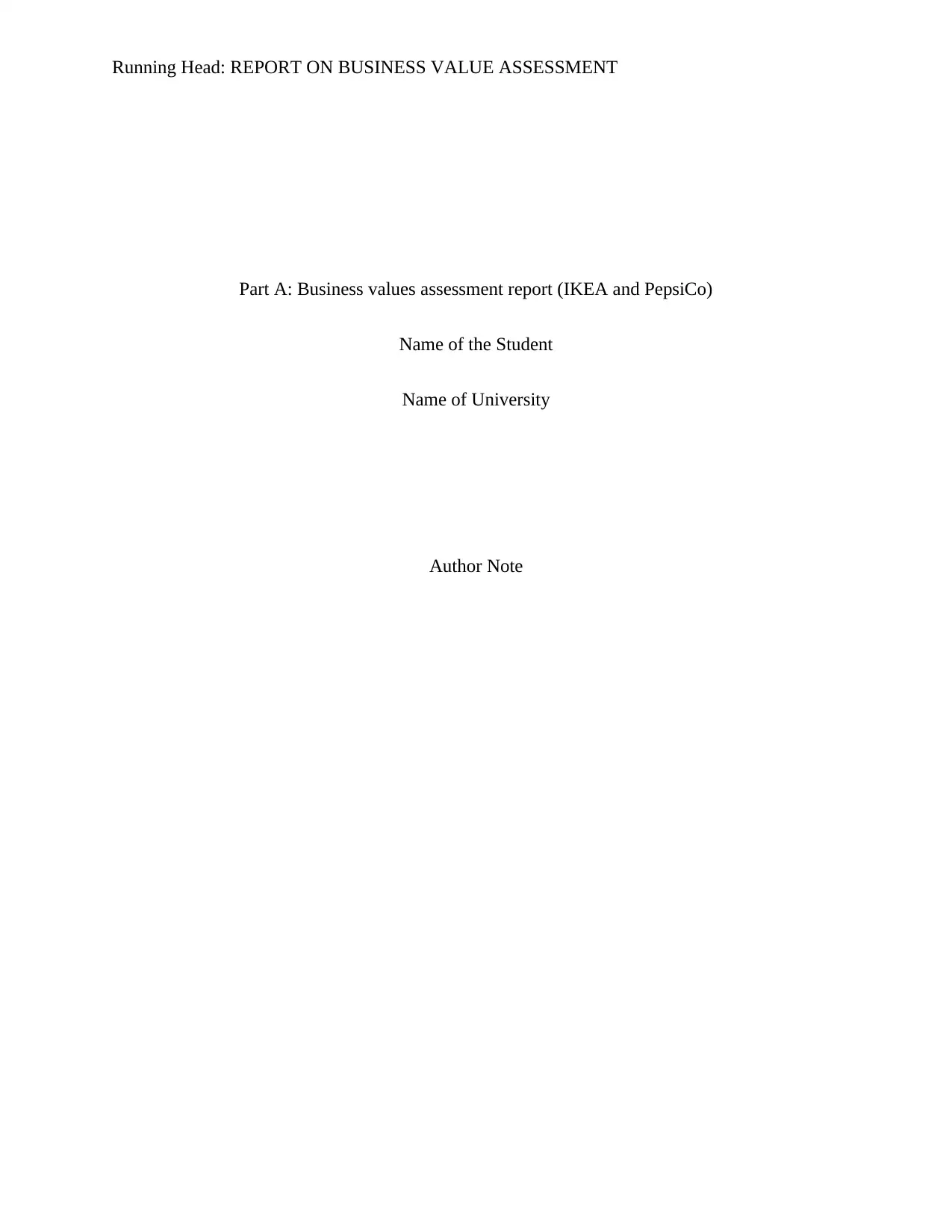
Running Head: REPORT ON BUSINESS VALUE ASSESSMENT
Part A: Business values assessment report (IKEA and PepsiCo)
Name of the Student
Name of University
Author Note
Part A: Business values assessment report (IKEA and PepsiCo)
Name of the Student
Name of University
Author Note
Paraphrase This Document
Need a fresh take? Get an instant paraphrase of this document with our AI Paraphraser
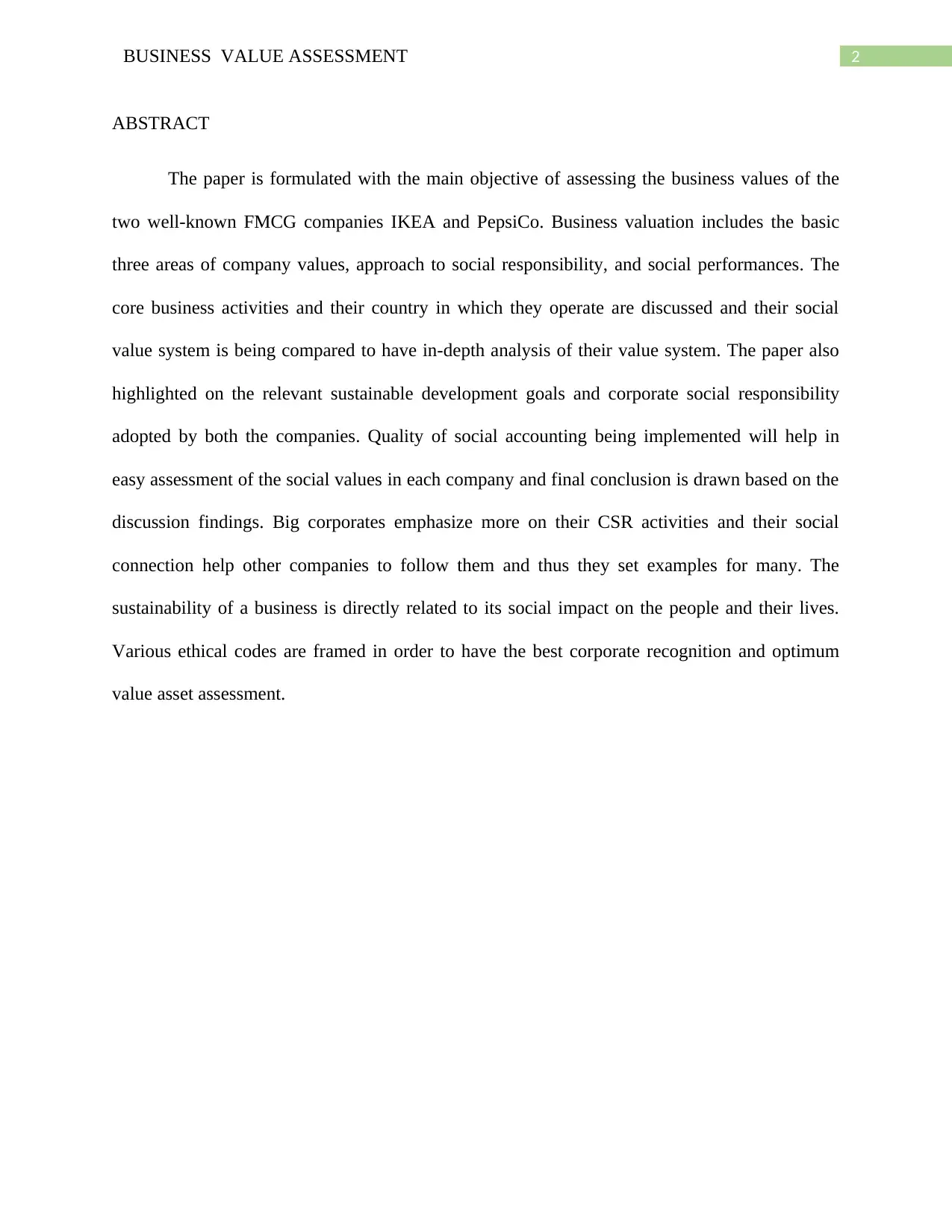
2BUSINESS VALUE ASSESSMENT
ABSTRACT
The paper is formulated with the main objective of assessing the business values of the
two well-known FMCG companies IKEA and PepsiCo. Business valuation includes the basic
three areas of company values, approach to social responsibility, and social performances. The
core business activities and their country in which they operate are discussed and their social
value system is being compared to have in-depth analysis of their value system. The paper also
highlighted on the relevant sustainable development goals and corporate social responsibility
adopted by both the companies. Quality of social accounting being implemented will help in
easy assessment of the social values in each company and final conclusion is drawn based on the
discussion findings. Big corporates emphasize more on their CSR activities and their social
connection help other companies to follow them and thus they set examples for many. The
sustainability of a business is directly related to its social impact on the people and their lives.
Various ethical codes are framed in order to have the best corporate recognition and optimum
value asset assessment.
ABSTRACT
The paper is formulated with the main objective of assessing the business values of the
two well-known FMCG companies IKEA and PepsiCo. Business valuation includes the basic
three areas of company values, approach to social responsibility, and social performances. The
core business activities and their country in which they operate are discussed and their social
value system is being compared to have in-depth analysis of their value system. The paper also
highlighted on the relevant sustainable development goals and corporate social responsibility
adopted by both the companies. Quality of social accounting being implemented will help in
easy assessment of the social values in each company and final conclusion is drawn based on the
discussion findings. Big corporates emphasize more on their CSR activities and their social
connection help other companies to follow them and thus they set examples for many. The
sustainability of a business is directly related to its social impact on the people and their lives.
Various ethical codes are framed in order to have the best corporate recognition and optimum
value asset assessment.
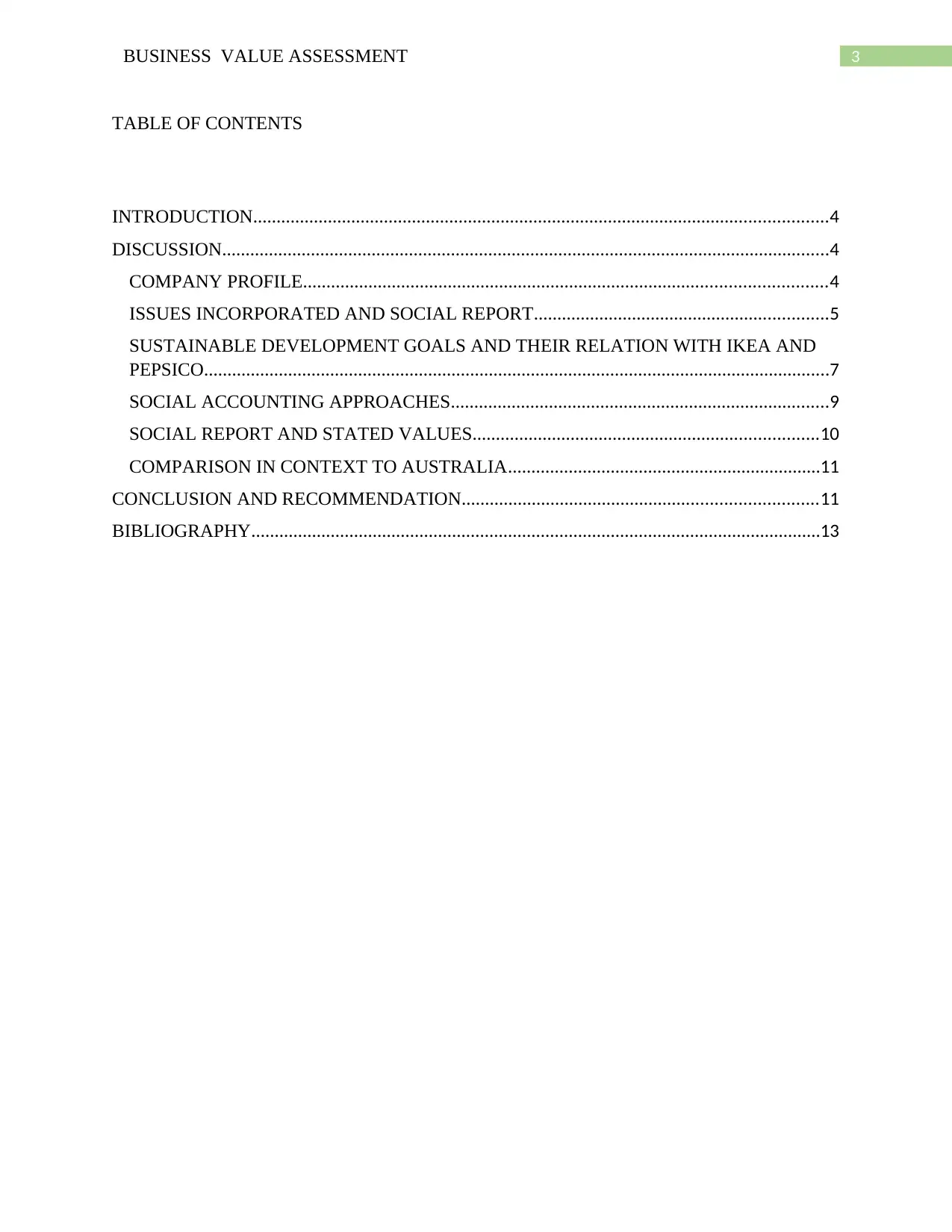
3BUSINESS VALUE ASSESSMENT
TABLE OF CONTENTS
INTRODUCTION...........................................................................................................................4
DISCUSSION..................................................................................................................................4
COMPANY PROFILE................................................................................................................4
ISSUES INCORPORATED AND SOCIAL REPORT...............................................................5
SUSTAINABLE DEVELOPMENT GOALS AND THEIR RELATION WITH IKEA AND
PEPSICO......................................................................................................................................7
SOCIAL ACCOUNTING APPROACHES.................................................................................9
SOCIAL REPORT AND STATED VALUES..........................................................................10
COMPARISON IN CONTEXT TO AUSTRALIA...................................................................11
CONCLUSION AND RECOMMENDATION............................................................................11
BIBLIOGRAPHY..........................................................................................................................13
TABLE OF CONTENTS
INTRODUCTION...........................................................................................................................4
DISCUSSION..................................................................................................................................4
COMPANY PROFILE................................................................................................................4
ISSUES INCORPORATED AND SOCIAL REPORT...............................................................5
SUSTAINABLE DEVELOPMENT GOALS AND THEIR RELATION WITH IKEA AND
PEPSICO......................................................................................................................................7
SOCIAL ACCOUNTING APPROACHES.................................................................................9
SOCIAL REPORT AND STATED VALUES..........................................................................10
COMPARISON IN CONTEXT TO AUSTRALIA...................................................................11
CONCLUSION AND RECOMMENDATION............................................................................11
BIBLIOGRAPHY..........................................................................................................................13
⊘ This is a preview!⊘
Do you want full access?
Subscribe today to unlock all pages.

Trusted by 1+ million students worldwide
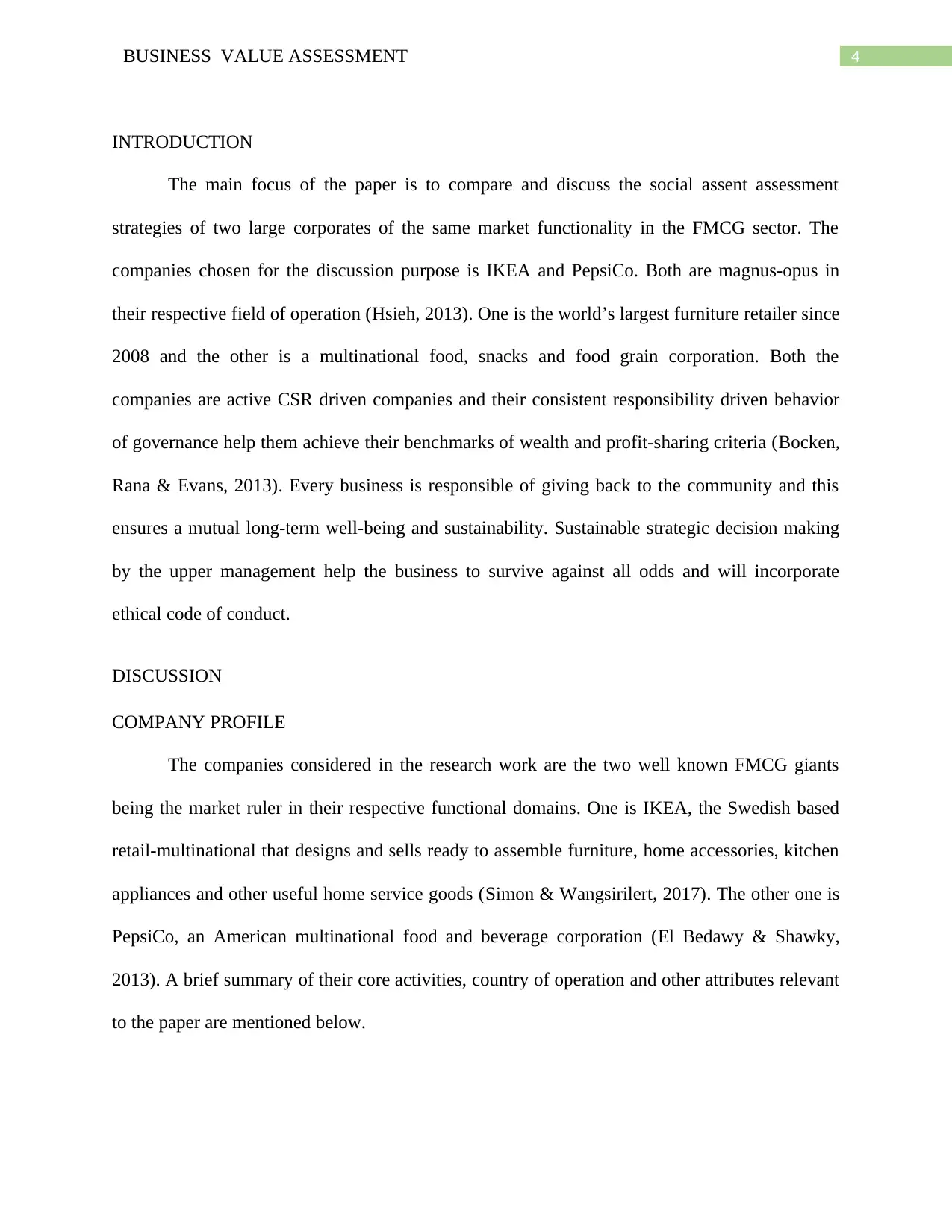
4BUSINESS VALUE ASSESSMENT
INTRODUCTION
The main focus of the paper is to compare and discuss the social assent assessment
strategies of two large corporates of the same market functionality in the FMCG sector. The
companies chosen for the discussion purpose is IKEA and PepsiCo. Both are magnus-opus in
their respective field of operation (Hsieh, 2013). One is the world’s largest furniture retailer since
2008 and the other is a multinational food, snacks and food grain corporation. Both the
companies are active CSR driven companies and their consistent responsibility driven behavior
of governance help them achieve their benchmarks of wealth and profit-sharing criteria (Bocken,
Rana & Evans, 2013). Every business is responsible of giving back to the community and this
ensures a mutual long-term well-being and sustainability. Sustainable strategic decision making
by the upper management help the business to survive against all odds and will incorporate
ethical code of conduct.
DISCUSSION
COMPANY PROFILE
The companies considered in the research work are the two well known FMCG giants
being the market ruler in their respective functional domains. One is IKEA, the Swedish based
retail-multinational that designs and sells ready to assemble furniture, home accessories, kitchen
appliances and other useful home service goods (Simon & Wangsirilert, 2017). The other one is
PepsiCo, an American multinational food and beverage corporation (El Bedawy & Shawky,
2013). A brief summary of their core activities, country of operation and other attributes relevant
to the paper are mentioned below.
INTRODUCTION
The main focus of the paper is to compare and discuss the social assent assessment
strategies of two large corporates of the same market functionality in the FMCG sector. The
companies chosen for the discussion purpose is IKEA and PepsiCo. Both are magnus-opus in
their respective field of operation (Hsieh, 2013). One is the world’s largest furniture retailer since
2008 and the other is a multinational food, snacks and food grain corporation. Both the
companies are active CSR driven companies and their consistent responsibility driven behavior
of governance help them achieve their benchmarks of wealth and profit-sharing criteria (Bocken,
Rana & Evans, 2013). Every business is responsible of giving back to the community and this
ensures a mutual long-term well-being and sustainability. Sustainable strategic decision making
by the upper management help the business to survive against all odds and will incorporate
ethical code of conduct.
DISCUSSION
COMPANY PROFILE
The companies considered in the research work are the two well known FMCG giants
being the market ruler in their respective functional domains. One is IKEA, the Swedish based
retail-multinational that designs and sells ready to assemble furniture, home accessories, kitchen
appliances and other useful home service goods (Simon & Wangsirilert, 2017). The other one is
PepsiCo, an American multinational food and beverage corporation (El Bedawy & Shawky,
2013). A brief summary of their core activities, country of operation and other attributes relevant
to the paper are mentioned below.
Paraphrase This Document
Need a fresh take? Get an instant paraphrase of this document with our AI Paraphraser
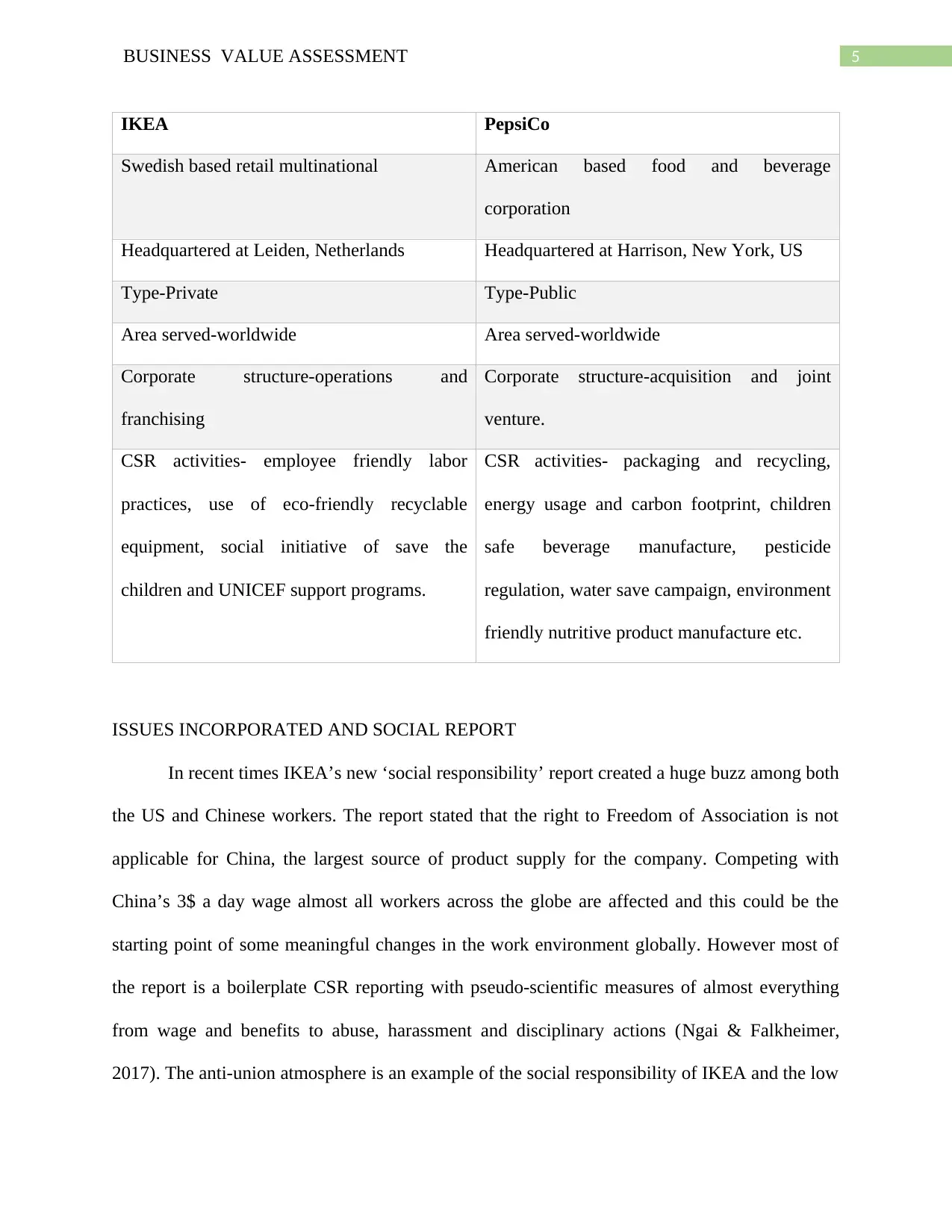
5BUSINESS VALUE ASSESSMENT
IKEA PepsiCo
Swedish based retail multinational American based food and beverage
corporation
Headquartered at Leiden, Netherlands Headquartered at Harrison, New York, US
Type-Private Type-Public
Area served-worldwide Area served-worldwide
Corporate structure-operations and
franchising
Corporate structure-acquisition and joint
venture.
CSR activities- employee friendly labor
practices, use of eco-friendly recyclable
equipment, social initiative of save the
children and UNICEF support programs.
CSR activities- packaging and recycling,
energy usage and carbon footprint, children
safe beverage manufacture, pesticide
regulation, water save campaign, environment
friendly nutritive product manufacture etc.
ISSUES INCORPORATED AND SOCIAL REPORT
In recent times IKEA’s new ‘social responsibility’ report created a huge buzz among both
the US and Chinese workers. The report stated that the right to Freedom of Association is not
applicable for China, the largest source of product supply for the company. Competing with
China’s 3$ a day wage almost all workers across the globe are affected and this could be the
starting point of some meaningful changes in the work environment globally. However most of
the report is a boilerplate CSR reporting with pseudo-scientific measures of almost everything
from wage and benefits to abuse, harassment and disciplinary actions (Ngai & Falkheimer,
2017). The anti-union atmosphere is an example of the social responsibility of IKEA and the low
IKEA PepsiCo
Swedish based retail multinational American based food and beverage
corporation
Headquartered at Leiden, Netherlands Headquartered at Harrison, New York, US
Type-Private Type-Public
Area served-worldwide Area served-worldwide
Corporate structure-operations and
franchising
Corporate structure-acquisition and joint
venture.
CSR activities- employee friendly labor
practices, use of eco-friendly recyclable
equipment, social initiative of save the
children and UNICEF support programs.
CSR activities- packaging and recycling,
energy usage and carbon footprint, children
safe beverage manufacture, pesticide
regulation, water save campaign, environment
friendly nutritive product manufacture etc.
ISSUES INCORPORATED AND SOCIAL REPORT
In recent times IKEA’s new ‘social responsibility’ report created a huge buzz among both
the US and Chinese workers. The report stated that the right to Freedom of Association is not
applicable for China, the largest source of product supply for the company. Competing with
China’s 3$ a day wage almost all workers across the globe are affected and this could be the
starting point of some meaningful changes in the work environment globally. However most of
the report is a boilerplate CSR reporting with pseudo-scientific measures of almost everything
from wage and benefits to abuse, harassment and disciplinary actions (Ngai & Falkheimer,
2017). The anti-union atmosphere is an example of the social responsibility of IKEA and the low
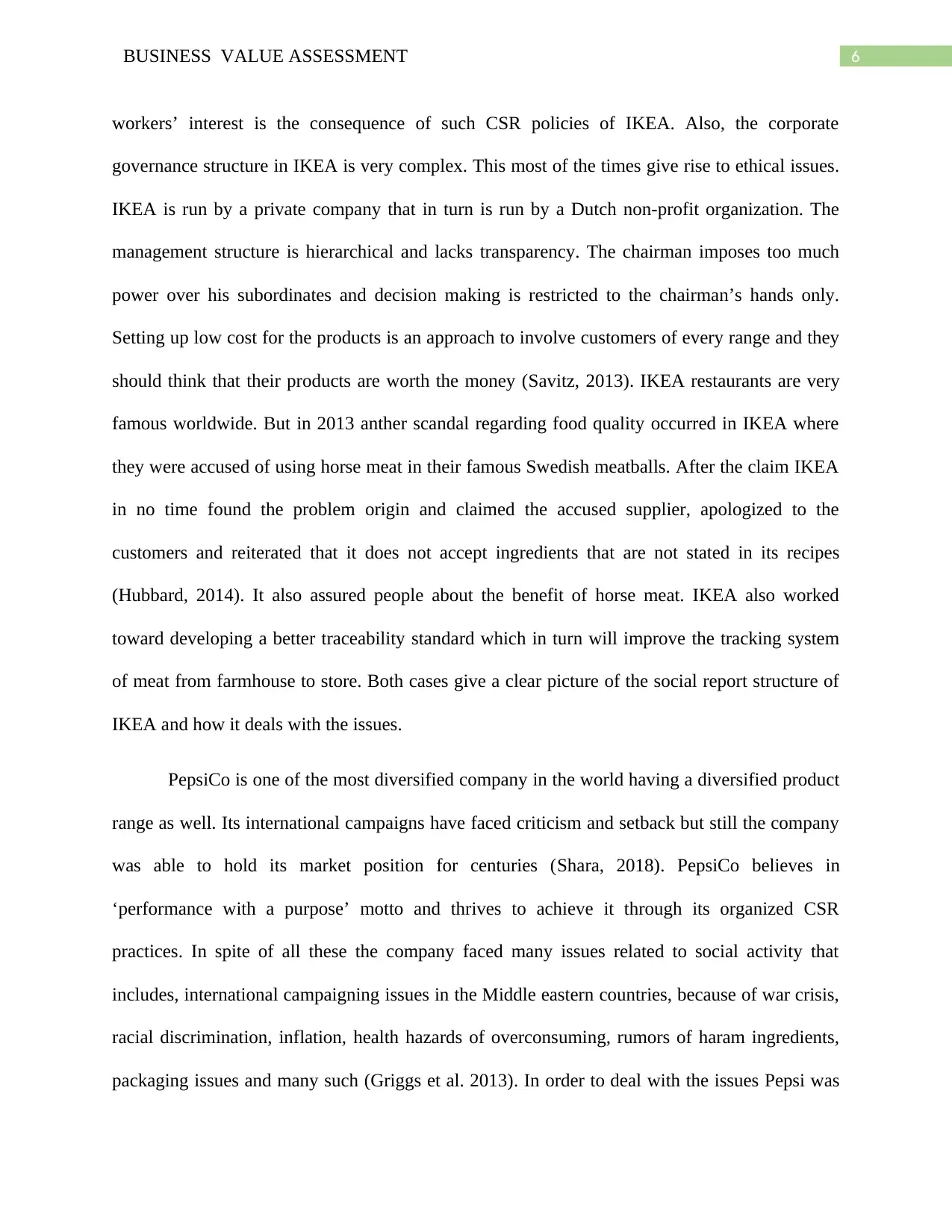
6BUSINESS VALUE ASSESSMENT
workers’ interest is the consequence of such CSR policies of IKEA. Also, the corporate
governance structure in IKEA is very complex. This most of the times give rise to ethical issues.
IKEA is run by a private company that in turn is run by a Dutch non-profit organization. The
management structure is hierarchical and lacks transparency. The chairman imposes too much
power over his subordinates and decision making is restricted to the chairman’s hands only.
Setting up low cost for the products is an approach to involve customers of every range and they
should think that their products are worth the money (Savitz, 2013). IKEA restaurants are very
famous worldwide. But in 2013 anther scandal regarding food quality occurred in IKEA where
they were accused of using horse meat in their famous Swedish meatballs. After the claim IKEA
in no time found the problem origin and claimed the accused supplier, apologized to the
customers and reiterated that it does not accept ingredients that are not stated in its recipes
(Hubbard, 2014). It also assured people about the benefit of horse meat. IKEA also worked
toward developing a better traceability standard which in turn will improve the tracking system
of meat from farmhouse to store. Both cases give a clear picture of the social report structure of
IKEA and how it deals with the issues.
PepsiCo is one of the most diversified company in the world having a diversified product
range as well. Its international campaigns have faced criticism and setback but still the company
was able to hold its market position for centuries (Shara, 2018). PepsiCo believes in
‘performance with a purpose’ motto and thrives to achieve it through its organized CSR
practices. In spite of all these the company faced many issues related to social activity that
includes, international campaigning issues in the Middle eastern countries, because of war crisis,
racial discrimination, inflation, health hazards of overconsuming, rumors of haram ingredients,
packaging issues and many such (Griggs et al. 2013). In order to deal with the issues Pepsi was
workers’ interest is the consequence of such CSR policies of IKEA. Also, the corporate
governance structure in IKEA is very complex. This most of the times give rise to ethical issues.
IKEA is run by a private company that in turn is run by a Dutch non-profit organization. The
management structure is hierarchical and lacks transparency. The chairman imposes too much
power over his subordinates and decision making is restricted to the chairman’s hands only.
Setting up low cost for the products is an approach to involve customers of every range and they
should think that their products are worth the money (Savitz, 2013). IKEA restaurants are very
famous worldwide. But in 2013 anther scandal regarding food quality occurred in IKEA where
they were accused of using horse meat in their famous Swedish meatballs. After the claim IKEA
in no time found the problem origin and claimed the accused supplier, apologized to the
customers and reiterated that it does not accept ingredients that are not stated in its recipes
(Hubbard, 2014). It also assured people about the benefit of horse meat. IKEA also worked
toward developing a better traceability standard which in turn will improve the tracking system
of meat from farmhouse to store. Both cases give a clear picture of the social report structure of
IKEA and how it deals with the issues.
PepsiCo is one of the most diversified company in the world having a diversified product
range as well. Its international campaigns have faced criticism and setback but still the company
was able to hold its market position for centuries (Shara, 2018). PepsiCo believes in
‘performance with a purpose’ motto and thrives to achieve it through its organized CSR
practices. In spite of all these the company faced many issues related to social activity that
includes, international campaigning issues in the Middle eastern countries, because of war crisis,
racial discrimination, inflation, health hazards of overconsuming, rumors of haram ingredients,
packaging issues and many such (Griggs et al. 2013). In order to deal with the issues Pepsi was
⊘ This is a preview!⊘
Do you want full access?
Subscribe today to unlock all pages.

Trusted by 1+ million students worldwide
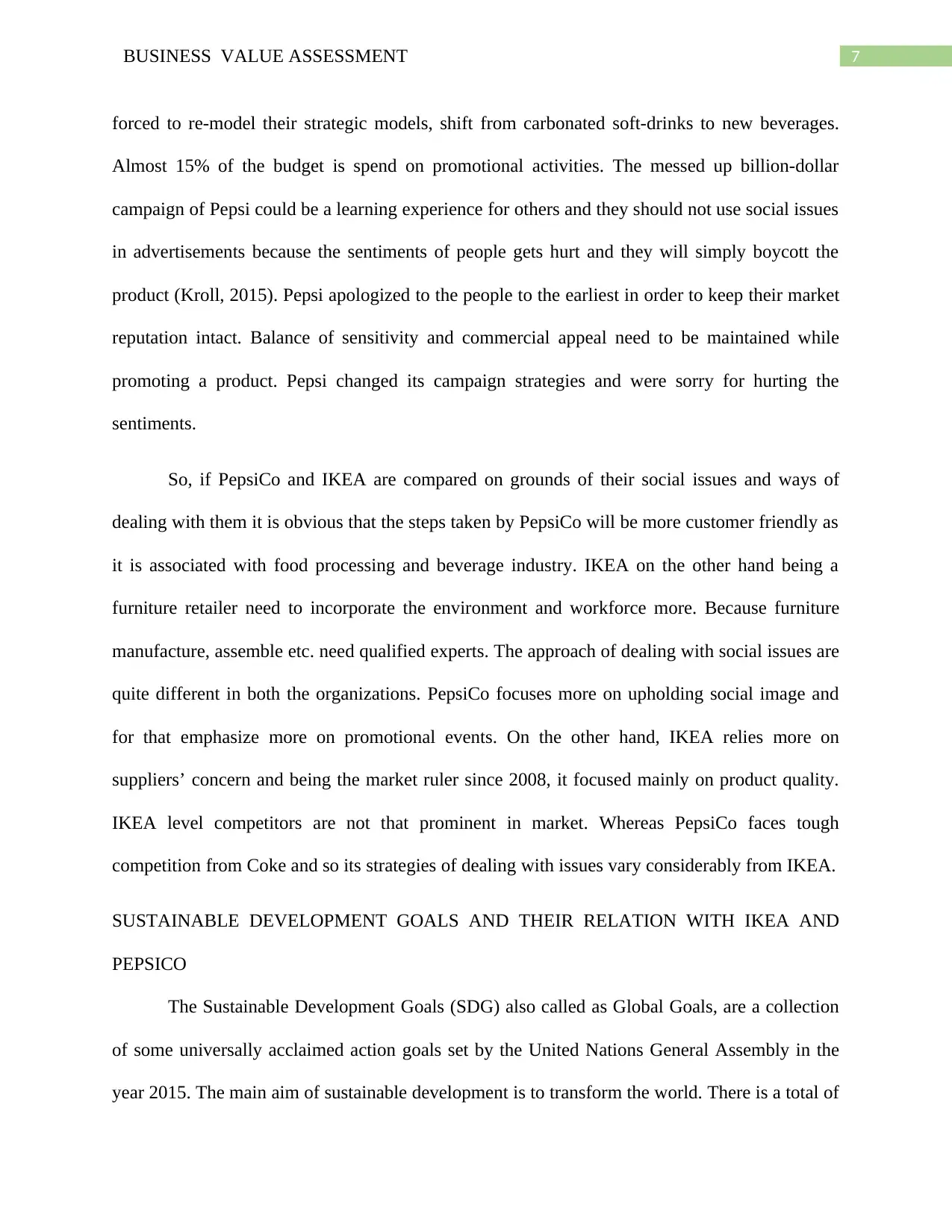
7BUSINESS VALUE ASSESSMENT
forced to re-model their strategic models, shift from carbonated soft-drinks to new beverages.
Almost 15% of the budget is spend on promotional activities. The messed up billion-dollar
campaign of Pepsi could be a learning experience for others and they should not use social issues
in advertisements because the sentiments of people gets hurt and they will simply boycott the
product (Kroll, 2015). Pepsi apologized to the people to the earliest in order to keep their market
reputation intact. Balance of sensitivity and commercial appeal need to be maintained while
promoting a product. Pepsi changed its campaign strategies and were sorry for hurting the
sentiments.
So, if PepsiCo and IKEA are compared on grounds of their social issues and ways of
dealing with them it is obvious that the steps taken by PepsiCo will be more customer friendly as
it is associated with food processing and beverage industry. IKEA on the other hand being a
furniture retailer need to incorporate the environment and workforce more. Because furniture
manufacture, assemble etc. need qualified experts. The approach of dealing with social issues are
quite different in both the organizations. PepsiCo focuses more on upholding social image and
for that emphasize more on promotional events. On the other hand, IKEA relies more on
suppliers’ concern and being the market ruler since 2008, it focused mainly on product quality.
IKEA level competitors are not that prominent in market. Whereas PepsiCo faces tough
competition from Coke and so its strategies of dealing with issues vary considerably from IKEA.
SUSTAINABLE DEVELOPMENT GOALS AND THEIR RELATION WITH IKEA AND
PEPSICO
The Sustainable Development Goals (SDG) also called as Global Goals, are a collection
of some universally acclaimed action goals set by the United Nations General Assembly in the
year 2015. The main aim of sustainable development is to transform the world. There is a total of
forced to re-model their strategic models, shift from carbonated soft-drinks to new beverages.
Almost 15% of the budget is spend on promotional activities. The messed up billion-dollar
campaign of Pepsi could be a learning experience for others and they should not use social issues
in advertisements because the sentiments of people gets hurt and they will simply boycott the
product (Kroll, 2015). Pepsi apologized to the people to the earliest in order to keep their market
reputation intact. Balance of sensitivity and commercial appeal need to be maintained while
promoting a product. Pepsi changed its campaign strategies and were sorry for hurting the
sentiments.
So, if PepsiCo and IKEA are compared on grounds of their social issues and ways of
dealing with them it is obvious that the steps taken by PepsiCo will be more customer friendly as
it is associated with food processing and beverage industry. IKEA on the other hand being a
furniture retailer need to incorporate the environment and workforce more. Because furniture
manufacture, assemble etc. need qualified experts. The approach of dealing with social issues are
quite different in both the organizations. PepsiCo focuses more on upholding social image and
for that emphasize more on promotional events. On the other hand, IKEA relies more on
suppliers’ concern and being the market ruler since 2008, it focused mainly on product quality.
IKEA level competitors are not that prominent in market. Whereas PepsiCo faces tough
competition from Coke and so its strategies of dealing with issues vary considerably from IKEA.
SUSTAINABLE DEVELOPMENT GOALS AND THEIR RELATION WITH IKEA AND
PEPSICO
The Sustainable Development Goals (SDG) also called as Global Goals, are a collection
of some universally acclaimed action goals set by the United Nations General Assembly in the
year 2015. The main aim of sustainable development is to transform the world. There is a total of
Paraphrase This Document
Need a fresh take? Get an instant paraphrase of this document with our AI Paraphraser
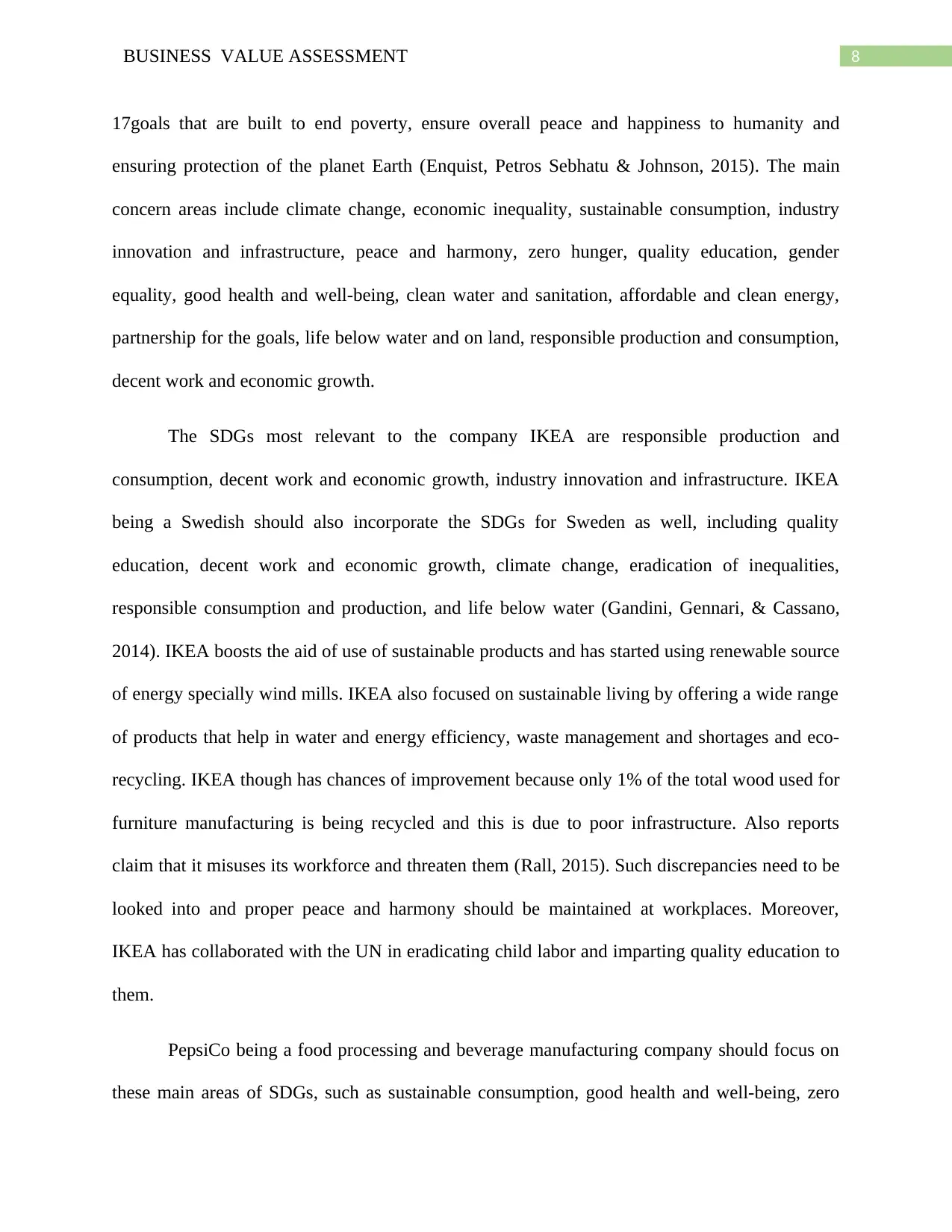
8BUSINESS VALUE ASSESSMENT
17goals that are built to end poverty, ensure overall peace and happiness to humanity and
ensuring protection of the planet Earth (Enquist, Petros Sebhatu & Johnson, 2015). The main
concern areas include climate change, economic inequality, sustainable consumption, industry
innovation and infrastructure, peace and harmony, zero hunger, quality education, gender
equality, good health and well-being, clean water and sanitation, affordable and clean energy,
partnership for the goals, life below water and on land, responsible production and consumption,
decent work and economic growth.
The SDGs most relevant to the company IKEA are responsible production and
consumption, decent work and economic growth, industry innovation and infrastructure. IKEA
being a Swedish should also incorporate the SDGs for Sweden as well, including quality
education, decent work and economic growth, climate change, eradication of inequalities,
responsible consumption and production, and life below water (Gandini, Gennari, & Cassano,
2014). IKEA boosts the aid of use of sustainable products and has started using renewable source
of energy specially wind mills. IKEA also focused on sustainable living by offering a wide range
of products that help in water and energy efficiency, waste management and shortages and eco-
recycling. IKEA though has chances of improvement because only 1% of the total wood used for
furniture manufacturing is being recycled and this is due to poor infrastructure. Also reports
claim that it misuses its workforce and threaten them (Rall, 2015). Such discrepancies need to be
looked into and proper peace and harmony should be maintained at workplaces. Moreover,
IKEA has collaborated with the UN in eradicating child labor and imparting quality education to
them.
PepsiCo being a food processing and beverage manufacturing company should focus on
these main areas of SDGs, such as sustainable consumption, good health and well-being, zero
17goals that are built to end poverty, ensure overall peace and happiness to humanity and
ensuring protection of the planet Earth (Enquist, Petros Sebhatu & Johnson, 2015). The main
concern areas include climate change, economic inequality, sustainable consumption, industry
innovation and infrastructure, peace and harmony, zero hunger, quality education, gender
equality, good health and well-being, clean water and sanitation, affordable and clean energy,
partnership for the goals, life below water and on land, responsible production and consumption,
decent work and economic growth.
The SDGs most relevant to the company IKEA are responsible production and
consumption, decent work and economic growth, industry innovation and infrastructure. IKEA
being a Swedish should also incorporate the SDGs for Sweden as well, including quality
education, decent work and economic growth, climate change, eradication of inequalities,
responsible consumption and production, and life below water (Gandini, Gennari, & Cassano,
2014). IKEA boosts the aid of use of sustainable products and has started using renewable source
of energy specially wind mills. IKEA also focused on sustainable living by offering a wide range
of products that help in water and energy efficiency, waste management and shortages and eco-
recycling. IKEA though has chances of improvement because only 1% of the total wood used for
furniture manufacturing is being recycled and this is due to poor infrastructure. Also reports
claim that it misuses its workforce and threaten them (Rall, 2015). Such discrepancies need to be
looked into and proper peace and harmony should be maintained at workplaces. Moreover,
IKEA has collaborated with the UN in eradicating child labor and imparting quality education to
them.
PepsiCo being a food processing and beverage manufacturing company should focus on
these main areas of SDGs, such as sustainable consumption, good health and well-being, zero
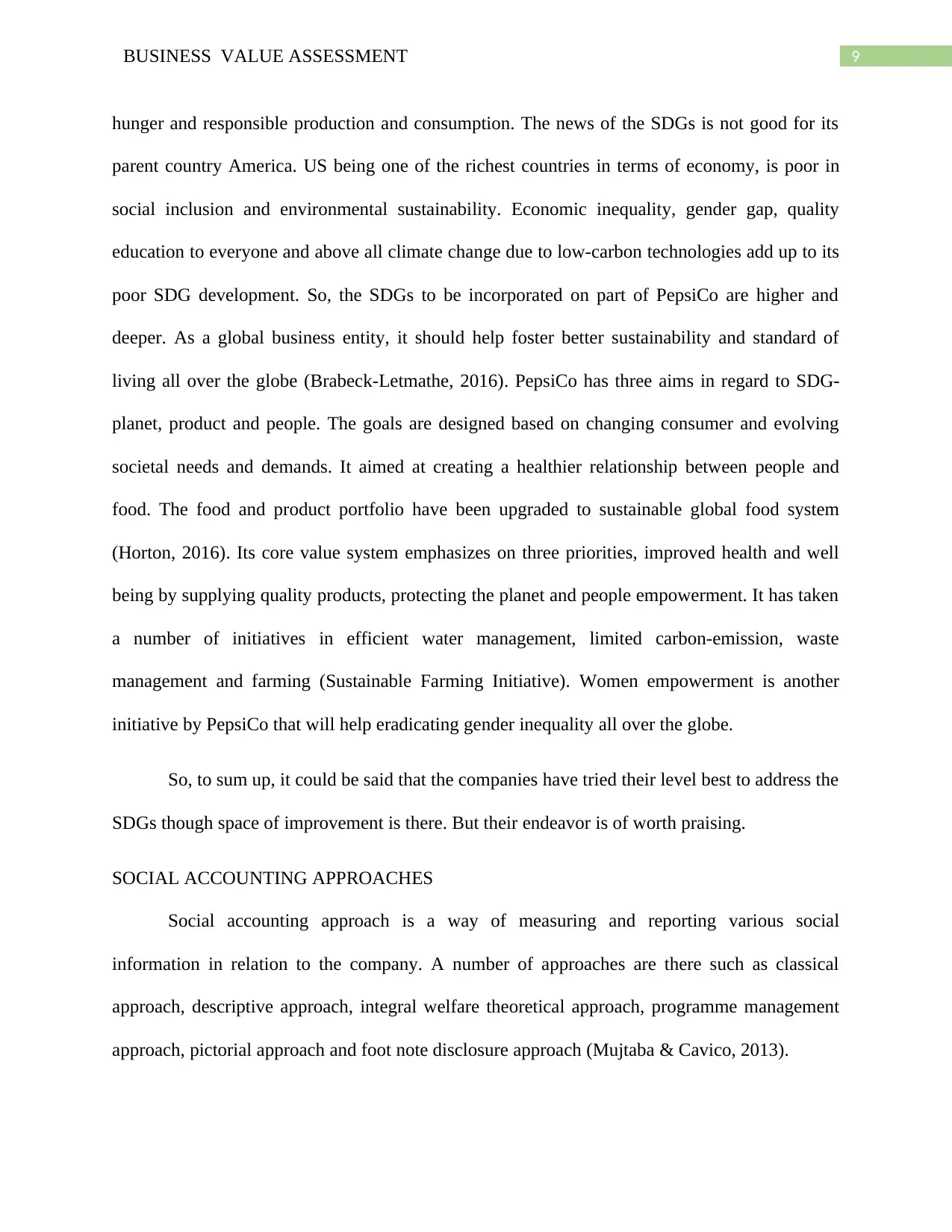
9BUSINESS VALUE ASSESSMENT
hunger and responsible production and consumption. The news of the SDGs is not good for its
parent country America. US being one of the richest countries in terms of economy, is poor in
social inclusion and environmental sustainability. Economic inequality, gender gap, quality
education to everyone and above all climate change due to low-carbon technologies add up to its
poor SDG development. So, the SDGs to be incorporated on part of PepsiCo are higher and
deeper. As a global business entity, it should help foster better sustainability and standard of
living all over the globe (Brabeck-Letmathe, 2016). PepsiCo has three aims in regard to SDG-
planet, product and people. The goals are designed based on changing consumer and evolving
societal needs and demands. It aimed at creating a healthier relationship between people and
food. The food and product portfolio have been upgraded to sustainable global food system
(Horton, 2016). Its core value system emphasizes on three priorities, improved health and well
being by supplying quality products, protecting the planet and people empowerment. It has taken
a number of initiatives in efficient water management, limited carbon-emission, waste
management and farming (Sustainable Farming Initiative). Women empowerment is another
initiative by PepsiCo that will help eradicating gender inequality all over the globe.
So, to sum up, it could be said that the companies have tried their level best to address the
SDGs though space of improvement is there. But their endeavor is of worth praising.
SOCIAL ACCOUNTING APPROACHES
Social accounting approach is a way of measuring and reporting various social
information in relation to the company. A number of approaches are there such as classical
approach, descriptive approach, integral welfare theoretical approach, programme management
approach, pictorial approach and foot note disclosure approach (Mujtaba & Cavico, 2013).
hunger and responsible production and consumption. The news of the SDGs is not good for its
parent country America. US being one of the richest countries in terms of economy, is poor in
social inclusion and environmental sustainability. Economic inequality, gender gap, quality
education to everyone and above all climate change due to low-carbon technologies add up to its
poor SDG development. So, the SDGs to be incorporated on part of PepsiCo are higher and
deeper. As a global business entity, it should help foster better sustainability and standard of
living all over the globe (Brabeck-Letmathe, 2016). PepsiCo has three aims in regard to SDG-
planet, product and people. The goals are designed based on changing consumer and evolving
societal needs and demands. It aimed at creating a healthier relationship between people and
food. The food and product portfolio have been upgraded to sustainable global food system
(Horton, 2016). Its core value system emphasizes on three priorities, improved health and well
being by supplying quality products, protecting the planet and people empowerment. It has taken
a number of initiatives in efficient water management, limited carbon-emission, waste
management and farming (Sustainable Farming Initiative). Women empowerment is another
initiative by PepsiCo that will help eradicating gender inequality all over the globe.
So, to sum up, it could be said that the companies have tried their level best to address the
SDGs though space of improvement is there. But their endeavor is of worth praising.
SOCIAL ACCOUNTING APPROACHES
Social accounting approach is a way of measuring and reporting various social
information in relation to the company. A number of approaches are there such as classical
approach, descriptive approach, integral welfare theoretical approach, programme management
approach, pictorial approach and foot note disclosure approach (Mujtaba & Cavico, 2013).
⊘ This is a preview!⊘
Do you want full access?
Subscribe today to unlock all pages.

Trusted by 1+ million students worldwide
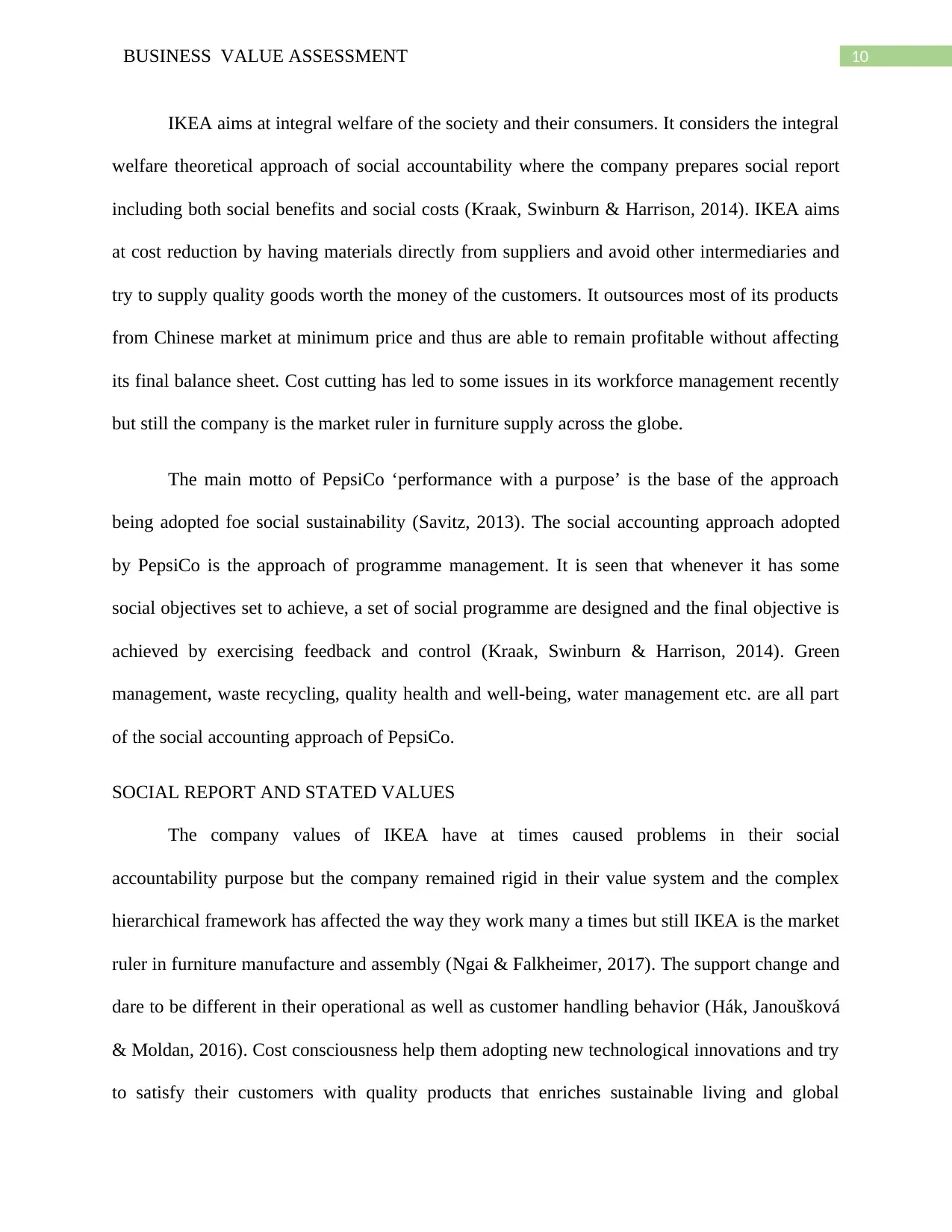
10BUSINESS VALUE ASSESSMENT
IKEA aims at integral welfare of the society and their consumers. It considers the integral
welfare theoretical approach of social accountability where the company prepares social report
including both social benefits and social costs (Kraak, Swinburn & Harrison, 2014). IKEA aims
at cost reduction by having materials directly from suppliers and avoid other intermediaries and
try to supply quality goods worth the money of the customers. It outsources most of its products
from Chinese market at minimum price and thus are able to remain profitable without affecting
its final balance sheet. Cost cutting has led to some issues in its workforce management recently
but still the company is the market ruler in furniture supply across the globe.
The main motto of PepsiCo ‘performance with a purpose’ is the base of the approach
being adopted foe social sustainability (Savitz, 2013). The social accounting approach adopted
by PepsiCo is the approach of programme management. It is seen that whenever it has some
social objectives set to achieve, a set of social programme are designed and the final objective is
achieved by exercising feedback and control (Kraak, Swinburn & Harrison, 2014). Green
management, waste recycling, quality health and well-being, water management etc. are all part
of the social accounting approach of PepsiCo.
SOCIAL REPORT AND STATED VALUES
The company values of IKEA have at times caused problems in their social
accountability purpose but the company remained rigid in their value system and the complex
hierarchical framework has affected the way they work many a times but still IKEA is the market
ruler in furniture manufacture and assembly (Ngai & Falkheimer, 2017). The support change and
dare to be different in their operational as well as customer handling behavior (Hák, Janoušková
& Moldan, 2016). Cost consciousness help them adopting new technological innovations and try
to satisfy their customers with quality products that enriches sustainable living and global
IKEA aims at integral welfare of the society and their consumers. It considers the integral
welfare theoretical approach of social accountability where the company prepares social report
including both social benefits and social costs (Kraak, Swinburn & Harrison, 2014). IKEA aims
at cost reduction by having materials directly from suppliers and avoid other intermediaries and
try to supply quality goods worth the money of the customers. It outsources most of its products
from Chinese market at minimum price and thus are able to remain profitable without affecting
its final balance sheet. Cost cutting has led to some issues in its workforce management recently
but still the company is the market ruler in furniture supply across the globe.
The main motto of PepsiCo ‘performance with a purpose’ is the base of the approach
being adopted foe social sustainability (Savitz, 2013). The social accounting approach adopted
by PepsiCo is the approach of programme management. It is seen that whenever it has some
social objectives set to achieve, a set of social programme are designed and the final objective is
achieved by exercising feedback and control (Kraak, Swinburn & Harrison, 2014). Green
management, waste recycling, quality health and well-being, water management etc. are all part
of the social accounting approach of PepsiCo.
SOCIAL REPORT AND STATED VALUES
The company values of IKEA have at times caused problems in their social
accountability purpose but the company remained rigid in their value system and the complex
hierarchical framework has affected the way they work many a times but still IKEA is the market
ruler in furniture manufacture and assembly (Ngai & Falkheimer, 2017). The support change and
dare to be different in their operational as well as customer handling behavior (Hák, Janoušková
& Moldan, 2016). Cost consciousness help them adopting new technological innovations and try
to satisfy their customers with quality products that enriches sustainable living and global
Paraphrase This Document
Need a fresh take? Get an instant paraphrase of this document with our AI Paraphraser
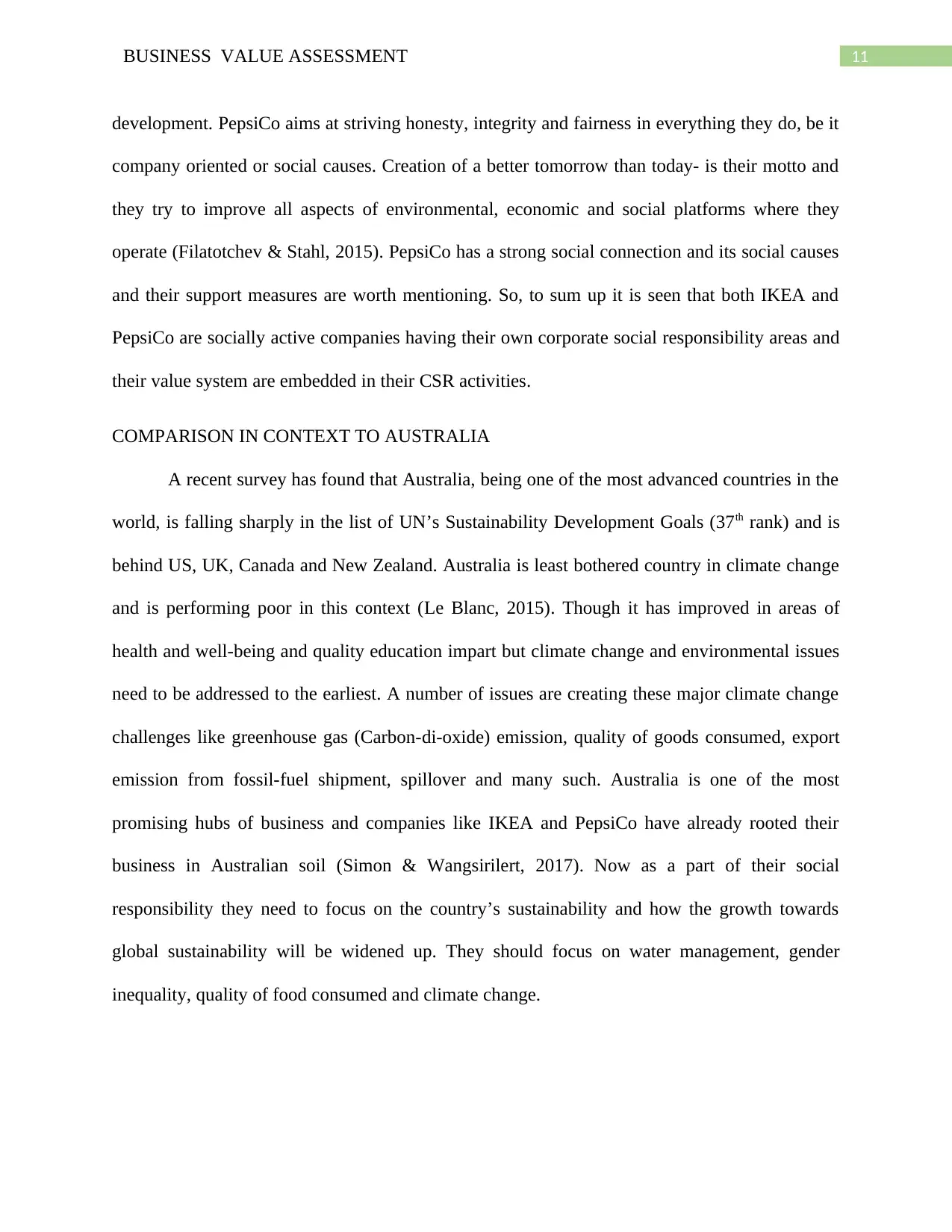
11BUSINESS VALUE ASSESSMENT
development. PepsiCo aims at striving honesty, integrity and fairness in everything they do, be it
company oriented or social causes. Creation of a better tomorrow than today- is their motto and
they try to improve all aspects of environmental, economic and social platforms where they
operate (Filatotchev & Stahl, 2015). PepsiCo has a strong social connection and its social causes
and their support measures are worth mentioning. So, to sum up it is seen that both IKEA and
PepsiCo are socially active companies having their own corporate social responsibility areas and
their value system are embedded in their CSR activities.
COMPARISON IN CONTEXT TO AUSTRALIA
A recent survey has found that Australia, being one of the most advanced countries in the
world, is falling sharply in the list of UN’s Sustainability Development Goals (37th rank) and is
behind US, UK, Canada and New Zealand. Australia is least bothered country in climate change
and is performing poor in this context (Le Blanc, 2015). Though it has improved in areas of
health and well-being and quality education impart but climate change and environmental issues
need to be addressed to the earliest. A number of issues are creating these major climate change
challenges like greenhouse gas (Carbon-di-oxide) emission, quality of goods consumed, export
emission from fossil-fuel shipment, spillover and many such. Australia is one of the most
promising hubs of business and companies like IKEA and PepsiCo have already rooted their
business in Australian soil (Simon & Wangsirilert, 2017). Now as a part of their social
responsibility they need to focus on the country’s sustainability and how the growth towards
global sustainability will be widened up. They should focus on water management, gender
inequality, quality of food consumed and climate change.
development. PepsiCo aims at striving honesty, integrity and fairness in everything they do, be it
company oriented or social causes. Creation of a better tomorrow than today- is their motto and
they try to improve all aspects of environmental, economic and social platforms where they
operate (Filatotchev & Stahl, 2015). PepsiCo has a strong social connection and its social causes
and their support measures are worth mentioning. So, to sum up it is seen that both IKEA and
PepsiCo are socially active companies having their own corporate social responsibility areas and
their value system are embedded in their CSR activities.
COMPARISON IN CONTEXT TO AUSTRALIA
A recent survey has found that Australia, being one of the most advanced countries in the
world, is falling sharply in the list of UN’s Sustainability Development Goals (37th rank) and is
behind US, UK, Canada and New Zealand. Australia is least bothered country in climate change
and is performing poor in this context (Le Blanc, 2015). Though it has improved in areas of
health and well-being and quality education impart but climate change and environmental issues
need to be addressed to the earliest. A number of issues are creating these major climate change
challenges like greenhouse gas (Carbon-di-oxide) emission, quality of goods consumed, export
emission from fossil-fuel shipment, spillover and many such. Australia is one of the most
promising hubs of business and companies like IKEA and PepsiCo have already rooted their
business in Australian soil (Simon & Wangsirilert, 2017). Now as a part of their social
responsibility they need to focus on the country’s sustainability and how the growth towards
global sustainability will be widened up. They should focus on water management, gender
inequality, quality of food consumed and climate change.
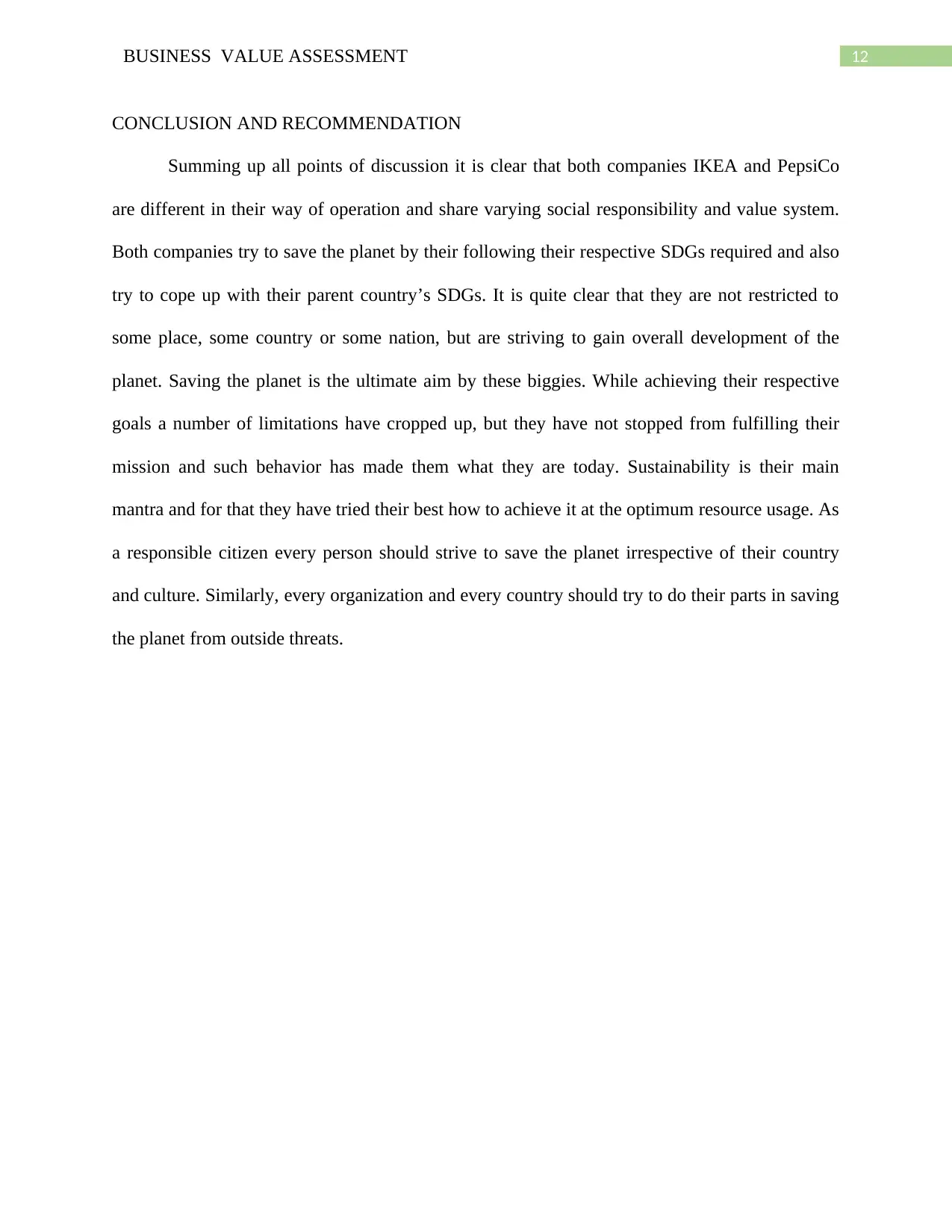
12BUSINESS VALUE ASSESSMENT
CONCLUSION AND RECOMMENDATION
Summing up all points of discussion it is clear that both companies IKEA and PepsiCo
are different in their way of operation and share varying social responsibility and value system.
Both companies try to save the planet by their following their respective SDGs required and also
try to cope up with their parent country’s SDGs. It is quite clear that they are not restricted to
some place, some country or some nation, but are striving to gain overall development of the
planet. Saving the planet is the ultimate aim by these biggies. While achieving their respective
goals a number of limitations have cropped up, but they have not stopped from fulfilling their
mission and such behavior has made them what they are today. Sustainability is their main
mantra and for that they have tried their best how to achieve it at the optimum resource usage. As
a responsible citizen every person should strive to save the planet irrespective of their country
and culture. Similarly, every organization and every country should try to do their parts in saving
the planet from outside threats.
CONCLUSION AND RECOMMENDATION
Summing up all points of discussion it is clear that both companies IKEA and PepsiCo
are different in their way of operation and share varying social responsibility and value system.
Both companies try to save the planet by their following their respective SDGs required and also
try to cope up with their parent country’s SDGs. It is quite clear that they are not restricted to
some place, some country or some nation, but are striving to gain overall development of the
planet. Saving the planet is the ultimate aim by these biggies. While achieving their respective
goals a number of limitations have cropped up, but they have not stopped from fulfilling their
mission and such behavior has made them what they are today. Sustainability is their main
mantra and for that they have tried their best how to achieve it at the optimum resource usage. As
a responsible citizen every person should strive to save the planet irrespective of their country
and culture. Similarly, every organization and every country should try to do their parts in saving
the planet from outside threats.
⊘ This is a preview!⊘
Do you want full access?
Subscribe today to unlock all pages.

Trusted by 1+ million students worldwide
1 out of 15
Related Documents
Your All-in-One AI-Powered Toolkit for Academic Success.
+13062052269
info@desklib.com
Available 24*7 on WhatsApp / Email
![[object Object]](/_next/static/media/star-bottom.7253800d.svg)
Unlock your academic potential
Copyright © 2020–2026 A2Z Services. All Rights Reserved. Developed and managed by ZUCOL.





